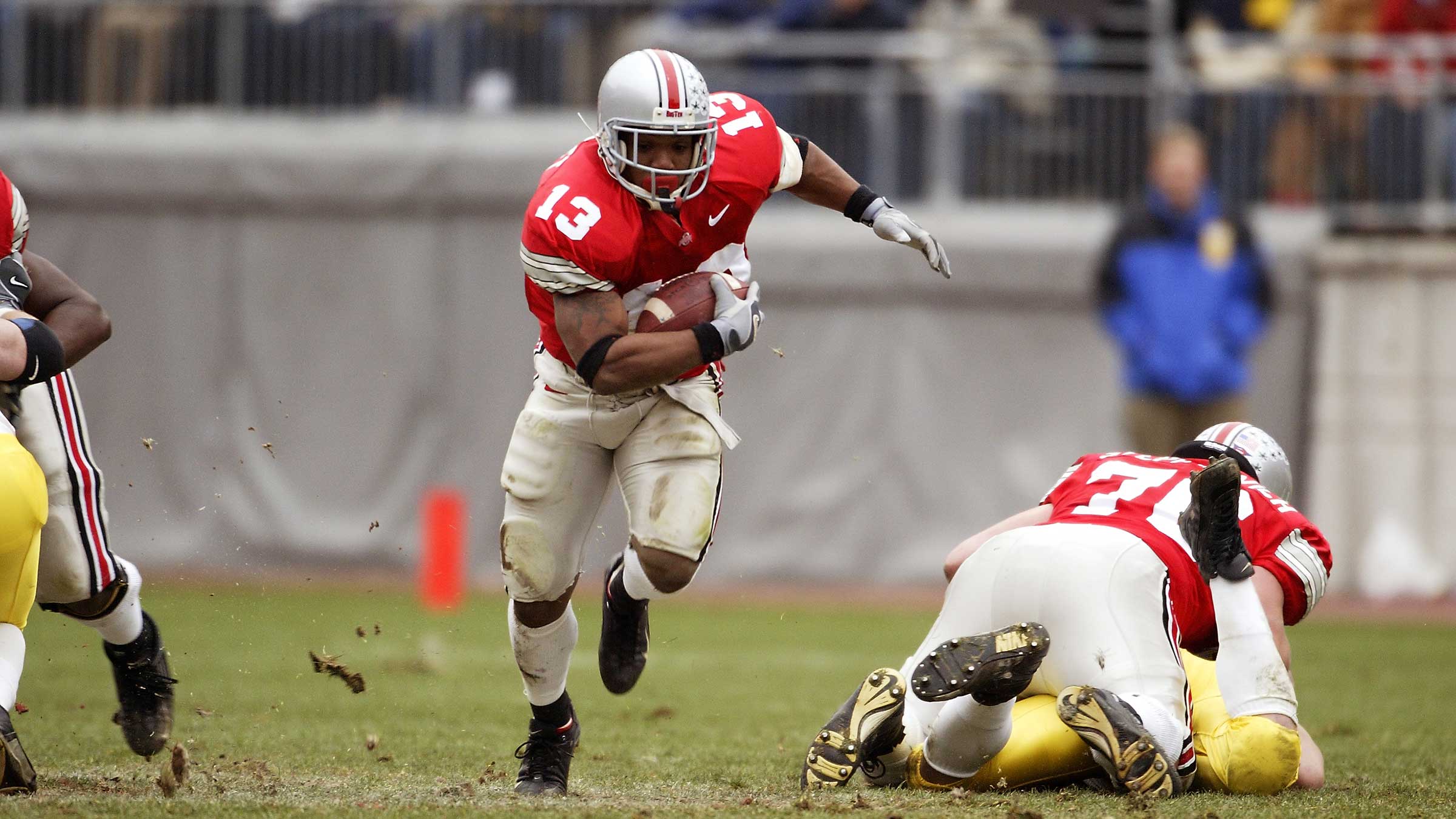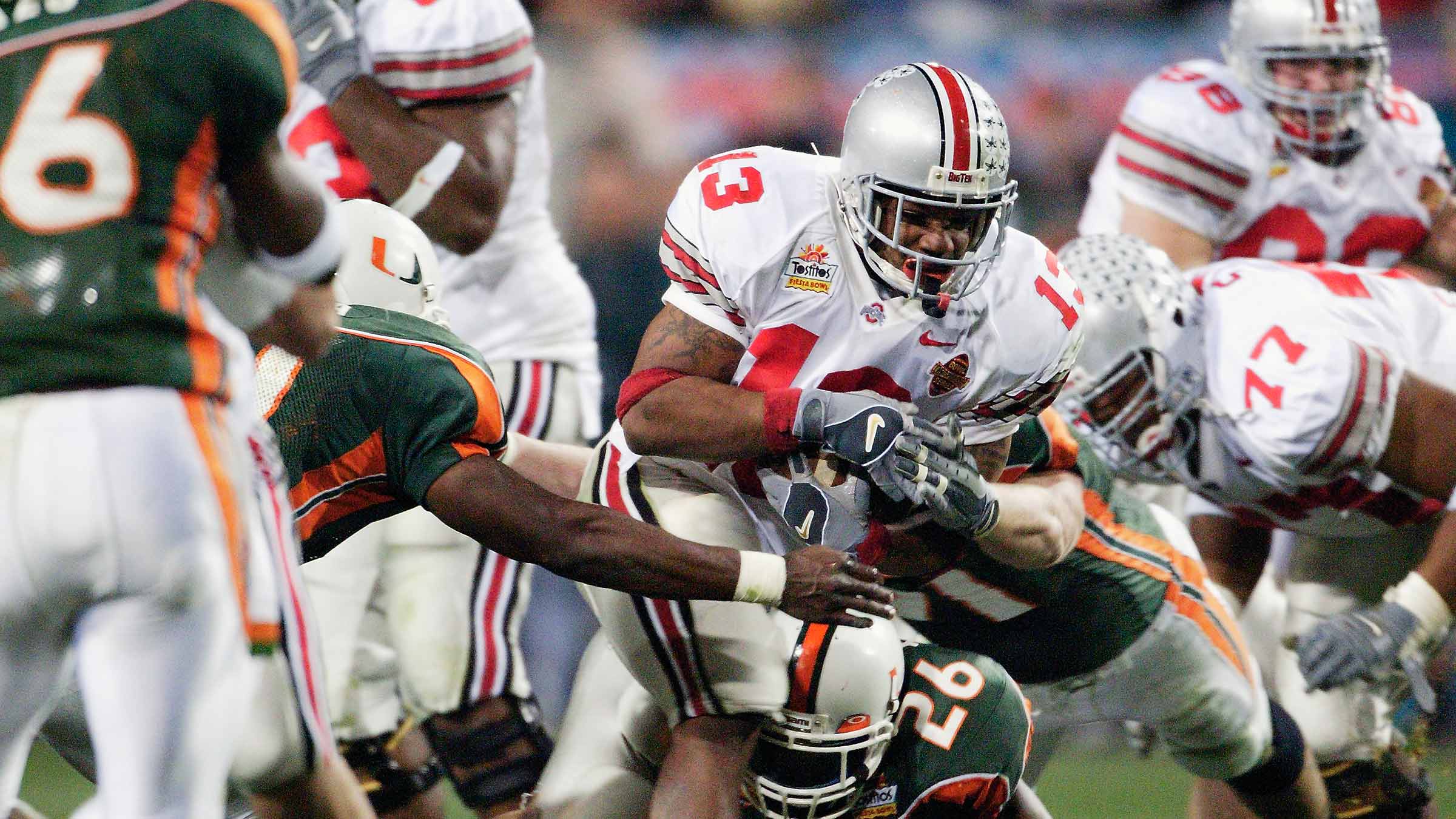From rock bottom to resilience
After a public fall from grace, Ohio State Buckeye football star Maurice Clarett rebuilt his life by addressing his mental health.
Most college football fans know about Maurice Clarett’s fall from celebrated star to convicted felon. They’re less likely to know Clarett’s real victory story of overcoming a mental health crisis. Today, Clarett is a passionate mental health advocate who believes in the power of reflection and the importance of mental health “fitness.”
Clarett’s achievement was celebrated in a full-circle moment when he accepted the 2025 STAR (Stress, Trauma And Resilience) Award at an event for Ohio State’s Department of Psychiatry and Behavioral Health.
That ceremony was in stark contrast with Clarett’s football suspension that occurred in the same building in September 2003. “Never in a million years did I think at that moment I would come back here to be celebrated,” Clarett says.
Clarett recalls a viral video of him wearing a Cleveland Indians hat and white jogging suit as he exited the Schottenstein Arena after his suspension. That was the day that triggered his depression. It was among his life’s lowest points.

“Coming to that same building to receive an award for mental health work shows that when you start to repair your life, God has a way of bringing you back to spaces where you were once shamed or you struggled, to allow a chance to reflect on your journey,” Clarett says.
Current Ohio State football head coach Ryan Day presented the STAR Award in front of an audience that included Clarett’s greatest supporters throughout his struggle — his family and his former Ohio State head football coach, Jim Tressel, who currently serves as lieutenant governor for the state of Ohio.
“You want to live long enough and do enough good to make your parents or guardians proud and justify their efforts in raising you,” Clarett says.
Clarett’s mental health struggle
Everyone deals with adversity, but most don’t experience their greatest highs and lows on a national stage.
Clarett was the first freshman running back to start for the Ohio State Buckeyes football team and was named Big Ten freshman of the year in 2002. Fans fondly recall his key plays, “the strip” and the go-ahead touchdown, helping Ohio State clinch the national championship that year.

Clarett’s triumph was overshadowed by his tumble down a spiral of depression, alcohol and drugs. He was positioned to be a Heisman Trophy contender for the 2003 football season, only to be suspended for receiving improper benefits worth thousands of dollars. After he was dismissed from Ohio State, Clarett faced another hurdle. He lost a court battle challenging the NFL rule that required players to wait three years after their high school graduation before entering the draft.
Alcohol use and depression throughout those setbacks led to Clarett’s 2006 arrest, trial and conviction for aggravated robbery and carrying a concealed weapon. The football star’s fall from glory was national news.
Healing through mental health care
Incarceration was the beginning of Clarett’s redemption. He had his first-ever mental health assessment and started a treatment plan, including medication that helps regulate his mood.
“Many people can’t conceptualize what mental health is, but once you get a good therapist who asks the right questions, you can discover the right answers,” he says.
Prison became Clarett’s mental health training camp. “People think if you’re out of shape physically, you need a diet and plan to get healthy, but in mental health, people just don’t buy into it,” Clarett says.
In prison, Clarett endured an abundance of isolation through 20 hours a day of lockdown. That left a lot of time to think and read. Months of isolation, medication, exercise and reading helped his mind start to clear. “I had time for reflection and growth. All of that was game-changing for me,” he says.
Through therapeutic intervention classes, individual therapy and self-help books, Clarett clarified his thoughts about the world and his place in it. “There’s a sense of peace you get when you understand what’s going on with you and then when you can develop a plan, work it and feel its effects,” he says.
Becoming a mental health advocate
Since his incarceration, Clarett has become a mental health advocate and motivational speaker nationwide. In 2016, he founded The Red Zone in his hometown of Youngstown, Ohio, providing school and community-based mental health services. “When you have a gift that the whole world likes, you end up getting platforms other people don’t get,” says Clarett.
It’s for his work to inspire others to get help and avoid his past mistakes that Clarett was honored with the STAR Award. “I didn’t have to go through all of what I went through if I had had interventions faster,” Clarett says.
At the presentation, K. Luan Phan, MD, chair of Psychiatry for the Ohio State University Wexner Medical Center, highlighted why mental health advocacy and education matters.
“We don’t do enough to prevent problems before they come up in the first place. Resilience means transforming the way we take care of people, not when they’re in crisis, but moving upstream before they fall in the river in the first place,” says Dr. Phan, who also holds the Jeffrey Schottenstein Endowed Chair of Psychiatry and Resilience.
Finding ways to intervene early and build resilience is the fundamental premise of the $20 million State of Ohio Adversity and Resilience (SOAR) initiative. This first-of-its-kind, statewide, multigenerational study is tracking risk and resilience factors for mental illness and addiction, with a goal to develop evidence-based strategies to develop effective treatments.

Building mental strength muscles
If Clarett had his way, athletes and students everywhere would have more opportunities to strengthen their mental health. “I believe mental health education should be part of the everyday curriculum. The world has changed to become a lot more complex, so the ability to take care of your mind far outweighs complicated math or English,” Clarett says.
Coach Day shared a similar sentiment at the award presentation. “If we get physically sick, we know what to do. We need to perceive mental health in the same way. Just like we focus on our bodies, we need to focus on our minds. Mental health affects us all, yet many of us don’t have a plan for prevention or care.”
Clarett considers his work to maintain his mental health similar to his efforts to strengthen his body.
“I’ve created a tool set to assist myself that’s no different than the routines I create to be in better shape,” he says.
When Clarett speaks to audiences about mental health, he recommends everyone strengthen their mental health muscles on their own through reading. “Some conversations can light up a spark in you, but a book gives you reflection,” he says.
The top two books he recommends are:
- “As a Man Thinketh,” by James Allen
- “Power vs. Force,” by David Hawkins, MD, PhD
Clarett poured his heart and story into his book, “One and Done: How My Life Started When My Football Career Ended.” Just as the title claims, Clarett says he wouldn’t change anything about his journey, as difficult as it was. “I wouldn’t have gotten to this point unless I went through all that.”

Support mental health resilience and healing
Give to support the Faces of Resilience.
Give today




